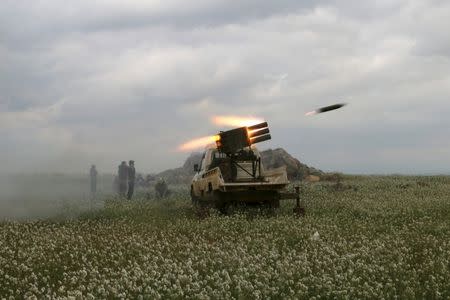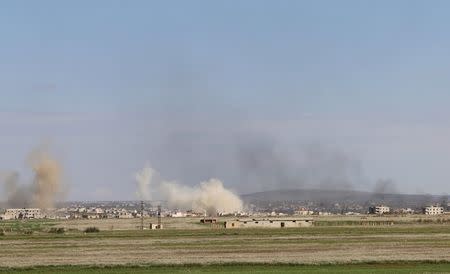Syrian rebels seize historic town in south - monitor
By Tom Perry BEIRUT (Reuters) - Insurgents seized a historic town in southern Syria from the government on Wednesday, a group monitoring the war said, part of a rebel counter-attack to stop Damascus reclaiming the border zone near Israel and Jordan. A Syrian military source reported heavy fighting with armed groups on Tuesday night in and around Bosra al-Sham, whose ancient city is listed as a UNESCO world heritage site. "We are investigating the facts in the field," the source said. An alliance of mainstream rebels who are backed by Western and Arab foes of President Bashar al-Assad said they had taken Bosra and declared the start of a new attack against government forces in another area of Deraa province to the northwest. Bosra's historic sites include a citadel built around a second century Roman amphitheatre. The area was the capital of the Roman province of Arabia. Syria's southwestern corner is of strategic importance due to its proximity to Damascus and neighbouring states Israel and Jordan. It is also the last significant foothold of mainstream rebels, who have mostly been crushed elsewhere in Syria by government forces or jihadist groups. An offensive launched by Assad's forces in early February made quick gains but its territorial advance then slowed. The mainstream rebels, known as "The Southern Front", say they have received more military support from Assad's foreign foes since the start of the push by the Syrian army and allied militia including the Lebanese group Hezbollah. Support to the Southern Front groups has been channelled via Jordan, a staunch ally of the United States. Washington says Assad has lost legitimacy and must leave power, although its focus has switched to fighting the Islamic State jihadist group that has seized swathes of northern and eastern Syria as well as chunks of Iraq. The monitoring group, the Syrian Observatory for Human Rights, said 21 insurgents had been killed in four days of fighting for Bosra, some 20 km (12 miles) north of the border with Jordan. FIGHTING IN WEST, NORTHWEST The spokesman for the Southern Front alliance said 85 percent of the fighters who took part in the attack were from mainstream rebel groups and the rest from Islamist factions. The Nusra Front, al Qaeda's wing in Syria, did not take part, said spokesman Issam al-Rayyes. The Southern Front launched the attack because the army had been mobilising pro-government militia in Bosra for a new stage of its offensive in the south, he added. The new attack announced by the Southern Front on Wednesday was aimed at taking Jadieh, some 80 km (50 miles) to the northwest of Bosra. The Syrian military said it had "thwarted an attempt by terrorist groups to infiltrate" a road in that area, killing a number of them and destroying two of their vehicles. In its daily report on military developments, the army also said it had inflicted heavy casualties on insurgents elsewhere in Deraa province. The rebels say they are waging a guerrilla campaign against the army and allied militias. "Our strategy was not to hold on to territory, but to attack in areas where the regime was not expecting it," Rayyes said. The southwestern corner of Syria is seen as a priority for the Damascus government as it tries to shore up its control over western regions including the cities of Homs and Hama, the border with Lebanon and the coast. In northwest Syria hardline Islamists including the Nusra Front and Ahrar al-Sham have launched an offensive to take the city of Idlib from the government. The Observatory reported heavy clashes between the sides on Wednesday. The Nusra Front ignited a car bomb on Idlib's outskirts, it said, identifying two of the bombers as Gulf Arabs. Idlib governor Kheir Eddin al-Sayid told Syrian state TV the attackers had been unable to enter the city and had sustained heavy losses. In fighting near the Lebanese border, the Syrian army and Hezbollah fighters cut an insurgent supply route from Syria towards the Lebanese border town of Arsal, officials said. Twenty-three militants were killed. (Additional reporting by Suleiman al-Khalidi in Amman; Writing by Tom Perry; Editing by Gareth Jones/Hugh Lawson)

 Yahoo News
Yahoo News 


